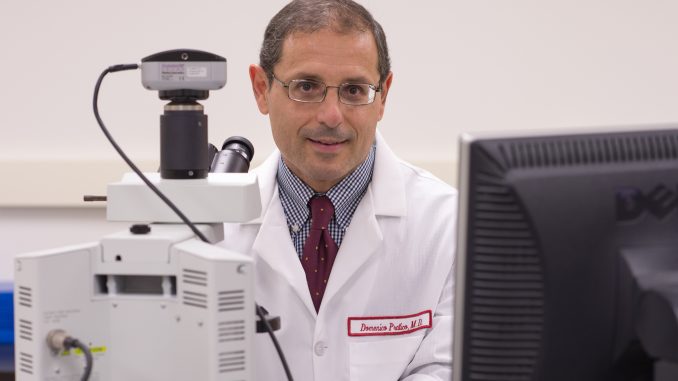
Researchers at the Lewis Katz School of Medicine believe they have pinpointed one of the earliest symptoms of Alzheimer’s disease.
The information, uncovered by Dr. Domenico Praticò and his research team from the Center for Translational Medicine, could be beneficial in developing treatments and improving chances for early identification of Alzheimer’s disease, which destroys memory and other mental functions.
“There have been several studies indicating that a deficit in glucose levels in the brain is a risk factor of developing Alzheimer’s disease,” Praticò said. “But nobody knew exactly how this happens.”
The study was twofold, Praticò said. First, the study investigated whether low glucose levels in mice impaired their memory or learning processes. Second, the scientists tried to understand the mechanisms behind the correlation between glucose levels and the development of Alzheimer’s disease.
“The brain is a very peculiar organ because it demands a lot of blood and energy compared to other organs,” Praticò said. “At the same time, it’s able to produce energy for its functions only using glucose. The brain is always in this fragile equilibrium, and anytime that glucose level shifts, it’s bad for your brain.”
The study compared two kinds of mice: genetically modified mice that were treated with a specific compound that blocked glucose from entering their nervous systems and mice that had normal levels of glucose in their brains.
At the end of the eight-week treatment, Praticò said the mice with glucose deficits had an impairment in their ability to learn and remember tasks.
The mice lacking glucose had nerve cells that struggled to communicate with each other, and that this was due to cells accumulating a compound that is toxic to normal function, Praticò said.
This compound, the researchers found, was called phosphorylated tau, a protein that tangles and kills nerve cells and is known to be very toxic. When the brain is deprived of glucose, an enzyme is released to create the protein.
“We were able to dissect the mechanism by which a chronic deficit in glucose can trigger this cascade in events which culminates in Alzheimer’s disease,” Praticò said.
Praticò said this new information will help develop preventative treatments and help doctors identify if an individual has a high risk of Alzheimer’s disease.
“Having this knowledge now, we can imagine a scenario where we can prevent that cascade of events that ultimately would result in the disease,” Praticò added.
This prospect has excited Temple students who have seen Alzheimer’s disease affect their family members.
Sierra Volkert, a sophomore exercise and sports science major, has a grandmother who was diagnosed with the disease nine years ago.
She said when she heard about the research done by the Katz School of Medicine, it “hit close to home.”
“It’s that much greater hearing that my school is advancing this research, since someone that I love is affected by the disease,” Volkert added.
Kerianne Mullen, a freshman early childhood education major, also had a grandmother diagnosed with Alzheimer’s who passed away two years ago.
“It’s really exciting to know that people care enough to spend their time on finding more information about the disease,” Mullen said. “My family struggled a lot seeing my Grandmom suffer from this horrible disease, and to know that people want to help someone like my Grandmom is really touching.”
Despite the discoveries the researchers made, the study is far from over.
“Science always has to move forward,” Praticò said. “The word ‘end’ doesn’t apply.”
The researchers plan to test their results on a different mouse model, as well as begin experimenting to see if this new knowledge can help reverse damage caused to the brain after Alzheimer’s disease has completely developed.
Noah Tanen can be reached at noah.tanen@temple.edu.



Be the first to comment